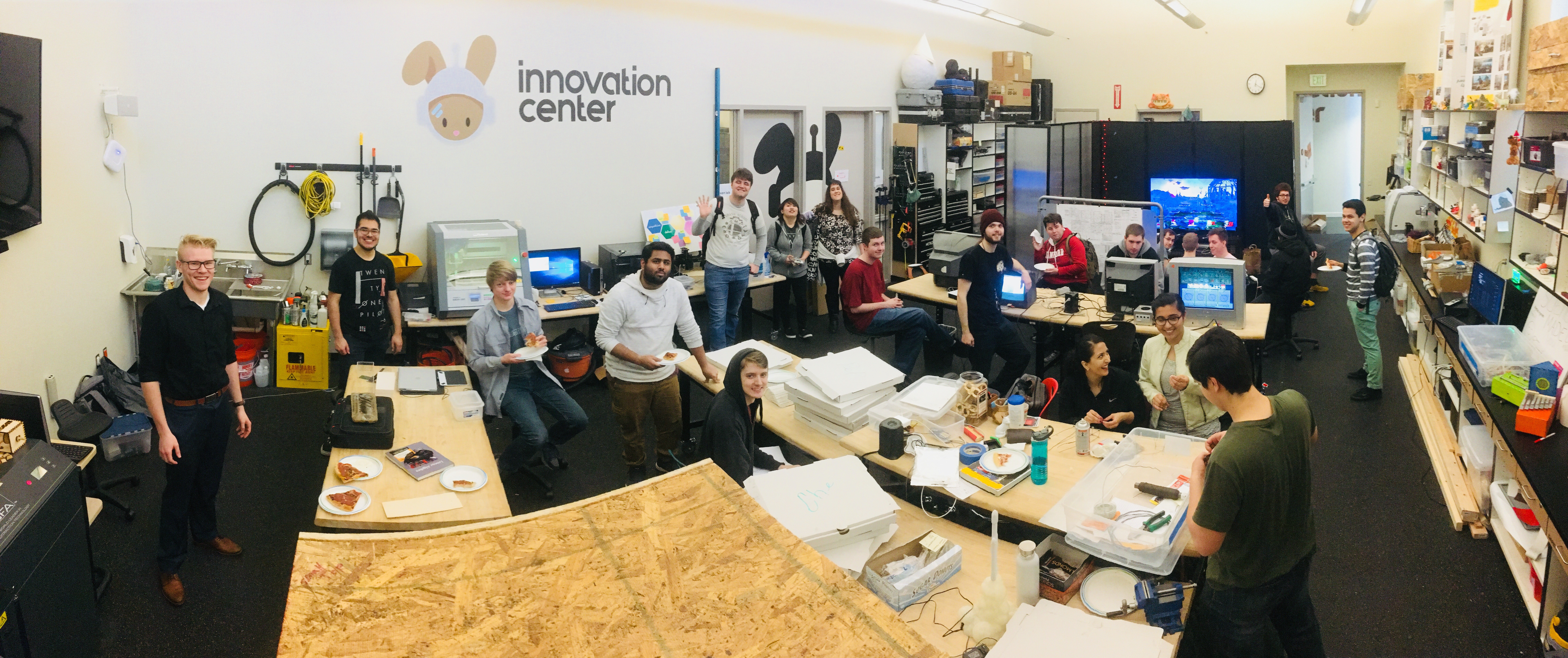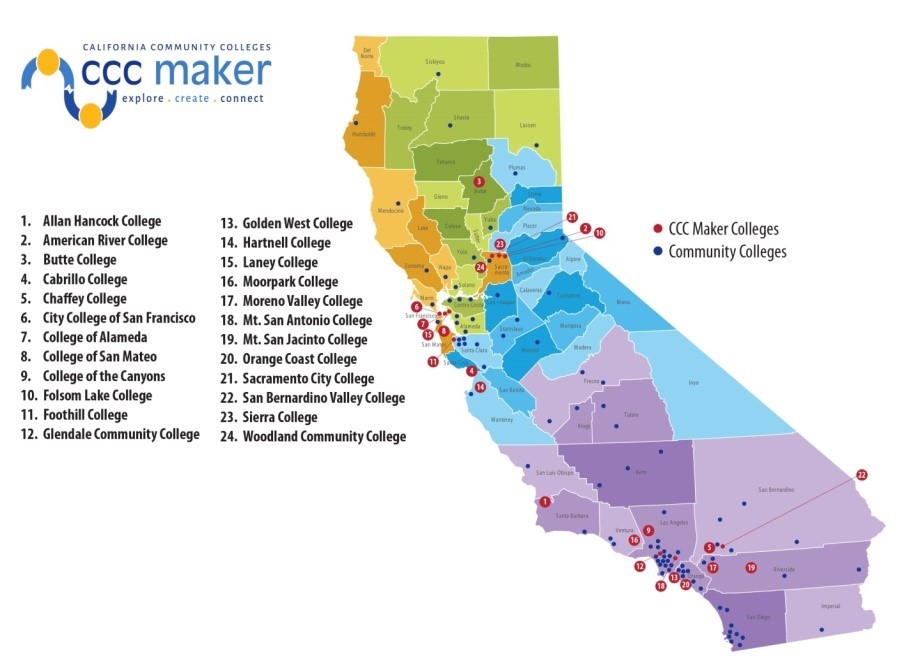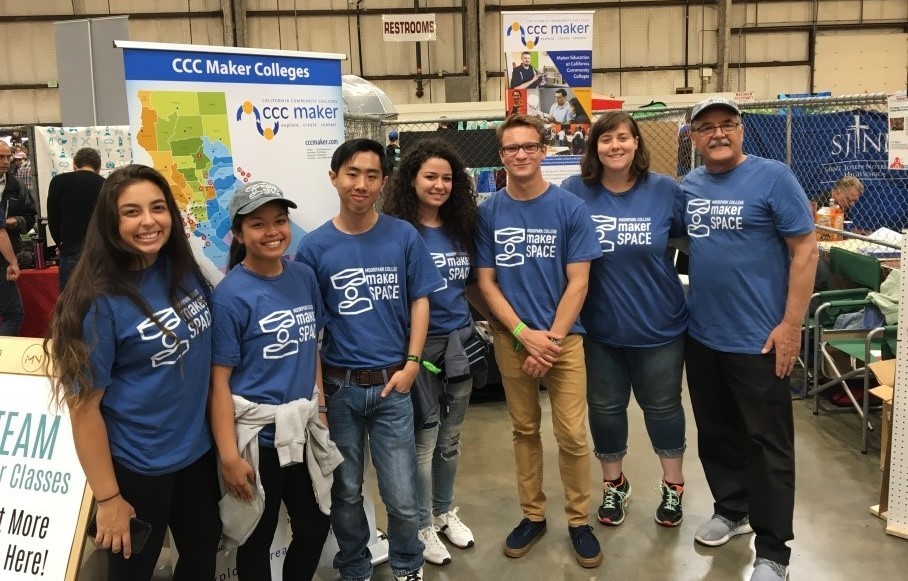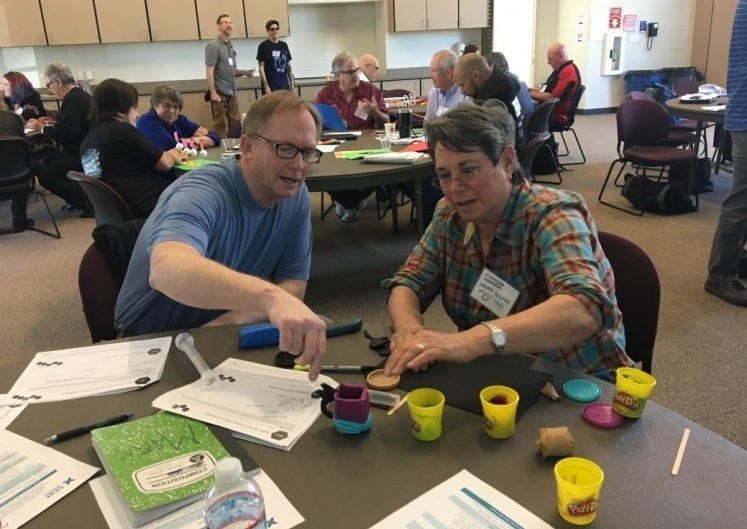College Makerspaces Develop Innovation-Ready Graduates

To prepare students for meaningful work, California Community Colleges (CCC) have invested $17M over three years in the CCC Maker initiative to facilitate a network of 24 college makerspace communities. What’s at stake is the untapped potential of the 2.1 million students in the largest and most diverse system of higher education in the country, according to Carol Pepper-Kittredge, CCC Maker Statewide Project Director and Associate Dean of Workforce Innovation at Sierra College. “I believe that makerspaces are transforming education,” said Pepper-Kittredge.
In an educational makerspace, surrounded by innovators encouraging them to explore and create, students have the freedom to become stronger self-directed learners. . . . By experiencing success and failure, the students learn how to iterate and innovate, developing an entrepreneurial mindset that will serve them in 21st century careers.
Funded by the CCC Chancellor’s Office under the Doing What MATTERS for Jobs and the Economy framework, 24 colleges across California have developed makerspaces designed to fit with their distinct ecosystems. The CCC Maker initiative provided a six-month lean startup process for 34 colleges interested in establishing makerspaces and encouraged colleges to build community before outfitting a makerspace. Of those, 24 colleges were funded for two years with CCC Maker grants of $100,000 to $350,000 per year based on the work plans that came out of the startup process.
In the spirit of the maker movement and to share the makerspace planning process with other educators, the CCC Maker initiative published the California Community College Makerspace Startup Guide, Preparing Students for Jobs of the Future, which is freely available from the CCC Maker website.
Educational Makerspaces Are International Phenomena
Support for campus makerspaces is building momentum across the country as evidenced by the formation of the Higher Education Makerspaces Initiatives (HEMI), a collaborative community made up of representatives from leading universities. Among the presentations at HEMI’s 3rd annual International Symposium on Academic Makerspaces (ISAM) conference in August 2018 were three from CCC Maker initiative participants—Allan Hancock College, Folsom Lake College, and the CCC Maker leadership team. Community colleges can access this international body of knowledge by reviewing the ISAM 2018 published papers.

Four Pillars of CCC Makerspaces
The four-pronged approach to establishing makerspaces used by the CCC Maker initiative focused on building community, developing maker curriculum, providing work-based learning experiences, and creating the physical makerspace. An advisory committee chaired by Make Media CEO Dale Dougherty has encouraged the colleges to view their makerspaces as “solution centers” for local businesses that benefit from students’ ingenuity harnessed through internships and as a source of talent for hiring. According to Dougherty, community colleges are in the unique position to democratize making by giving students access to makerspaces. “Students develop the ability to learn, adapt, and change when they join a maker community,” said Dougherty. “As students create projects that reflect their interests and abilities and share it with students from other disciplines such as art, engineering, or business, it can change the nature of their lives.”
The CCC Maker initiative is administered by Sierra College. CCC Maker colleges are supported by Deborah Bird and Salomon Davila, Technical Assistance Providers who coach and support the college teams. Symposiums on workplace skills and maker curriculum have been offered through partners such as the New World of Word and the California Council on Science and Technology. These in-person events, combined with an online Workplace by Facebook platform, have built a community of practice among educators separated by hundreds of miles across the state. The initiative has offered 36 webinars to guide implementation and participation, including extensive financial reporting support.
The colleges have been given unprecedented access to the CCC Maker website where they have their own pages and have jointly contributed over 350 blog posts. The website also posts a ClicData graphic report that shows the results of colleges’ quarterly reporting through Smartsheet. During year one of implementation, dashboard data submitted by the colleges noted the following:
- 16,566 students accessed makerspaces, participated in 1,216 student activities, and earned 443 badges
- 869 students were recruited for internships and 576 received pre-placement training
- 600 employers were recruited and provided 209 internships
- 195 advisory committee meetings were held and industry partners gave 2,227 match hours
- 1,081 faculty members attended 360 professional development activities
Student Leaders Rise Out of Makerspaces
Students indicate that one of the most powerful outcomes from their involvement in a makerspace is the sense of community, explained Sierra College Superintendent/President Willy Duncan. "In a makerspace, students develop their own multidisciplinary community by connecting with other students, faculty, and industry partners," said Duncan. "As a makerspace community member, students shape the culture, take ownership of the space, and become mentors and instructors. The chance for students to interact both formally and informally with industry experts facilitates authentic relationships and career networking."

During the startup phase, CCC Maker encouraged colleges to map their ecosystem using Kumu.io; hold advisory meetings; connect with makers in their community; host student events as a prototype for the makerspace; and connect with faculty, administrators, and staff to build campuswide support for the project. Before the makerspace even existed, Sacramento City College used student-designed posters and events to build community and promote inclusivity to reach economically challenged students. Students helped design the space, documented the process, installed equipment, and taught others to use the tools. Documentation of their process led to videos shared at national events, including the International Symposium of Academic Makerspaces and the Nation of Makers inaugural conference.
Internships Based on Makerspace Skills
To propel students toward careers that will value innovation-ready graduates, the CCC Maker initiative is funding up to 800 20-hour internships often supplemented by another 20-hour match from employers. Training for the internships is based in the makerspace, where students learn workplace soft skills as well as technical skills on makerspace tools. For example, Sierra College prepared 25 students for internships by delivering New World of Work training and providing workshops in design, laser cutting, and 3D printing.
Students who have experimented and built projects in a makerspace are primed with valuable workplace skills, according to Pat Crain, Software Engineering and Data Science Manager at The Shop, VSP Global, and CCC Maker advisory committee member. "Seeing the talents of Sacramento City College students working in their makerspace inspired me to work with the college and CCC Maker to develop a design thinking project," said Crain. "Employers want employees with problem solving experience and the ability to work with a team to iterate and create prototypes. Community college makerspaces can be the source of future employees prepared with relevant skills."
Cabrillo College partnered with Goodwill Central Coast to facilitate student internships with businesses in the Santa Cruz area. Digital fabrication student Megan Barrett was placed in an internship with MOD, the Children’s Discovery Museum in Santa Cruz, to create a front window display. “What is so exciting about the makerspace internship program is the real experience,” said Barrett. “I got experience managing a budget, managing my time, and problem solving.”
Faculty Engage With the Makerspace
Foothill College's Krause Center for Innovation, supported in part by the CCC Maker grant, offers training to makerspace educators from elementary, middle, and high schools as well as colleges, explained Thuy Thi Nguyen, President of Foothill College. "Maker education is part of a movement that democratizes innovation and, consequently, requires proactively finding ways to bring in people who normally would not have access to such tools and curriculum," said Nguyen. "Makerspaces are a vehicle for transforming students' educational experience by engaging them in their own learning to find solutions to real-world problems that they care about."

The Krause Center for Innovation at Foothill College offered a Makerspace Coordinator certificate and Maker UniDIVersity program for women, especially women of color. To encourage faculty to consider inserting making into their curriculum, Sierra College held Crafternoons for faculty members at the Hacker Lab powered by Sierra College as well as professional development on Makefulness. City College of San Francisco conducted faculty professional development based on research into equity and access in the maker movement.
CCC Maker colleges found unique ways to embed making into curriculum. Cabrillo College offers a Digital Fabrication in the Arts course to teach maker skills. At American River College, the Spanish 361 class visited the James Kaneko Gallery on campus, selected the Spanish word that best captured their experience, and laser etched the word at the Design Hub. Orange Coast College developed curriculum focused on the action sports industry in the San Diego region to teach students to design, engineer, and make skateboards, surfboards, and paddleboards. And Golden West College conducted a design thinking experience for students at the Imaginology Fair in Orange County.
The colleges are also engaging their K-12 partners. Golden West College presented a summer Design Thinking Academy in the college makerspace and Moreno Valley College offered a cybercamp at the makerspace to 117 middle and high school students who learned and practiced cybersecurity and coding.
Diverse Approaches Based on Ecosystems
In California, the makerspaces took a different form at each of the colleges, increasing the chance for the network to learn as they shared their varied approaches. For example, Cabrillo College formed a campus team representing arts, sciences, and technology to lead the creation and management of the makerspace. Sierra College created mini makerspaces on campuses and established three private-public partnerships with community-based makerspaces near its campuses in Rocklin, Nevada County, and Tahoe Truckee. Moreno Valley College outfitted the iMAKEMOBILE, a mobile rapid prototype design space that can serve the campus and community.
Makerspaces Make Sense for Students
College makerspaces are taking an innovative approach to engaging students; teaching cross-disciplinary courses; delivering skills certification; and connecting a community of students, faculty, and industry partners. For community colleges seeking innovative ways to inspire, engage, and prepare students for success, makerspaces offer an enriching complement to what is taught in the classroom.
Kimberly Glaster, a Sacramento City College student, indicated that one of the greatest benefits that a makerspace offers to students is the opportunity to gain real-world experience in a community environment. “Students from all backgrounds can come to one location to work together as a team to create an idea or thought into something tangible,” said Glaster.
A community college makerspace can serve as an engine for local economic development, creative placemaking, and community revitalization, commented Stephanie Santoso, Director of Maker Initiatives, US2020; founding Board Member of Nation of Makers; and CCC Maker advisory committee member. According to Santoso,
Because community colleges are accessible to everyone, they play a critical role in lowering the barriers to entry for students of all ages and backgrounds to engage in making and learn valuable skills that empower them to become entrepreneurs, prepare them for the jobs of the future, and solve community-based problems. The CCC Maker Initiative is a wonderful example of how this can take place and can serve as inspiration and [as] a resource for other communities.
This issue of Innovation Showcase continues the story introduced in the April 2018 issue titled, Sierra College Incorporates the Maker Mindset Into Education.
Karen Fraser-Middleton is responsible for Strategic Communication for the California Community Colleges CCC Maker Initiative and is president of Marketing Action, Inc.
Opinions expressed in Innovation Showcase are those of the author(s) and do not necessarily reflect those of the League for Innovation in the Community College.










